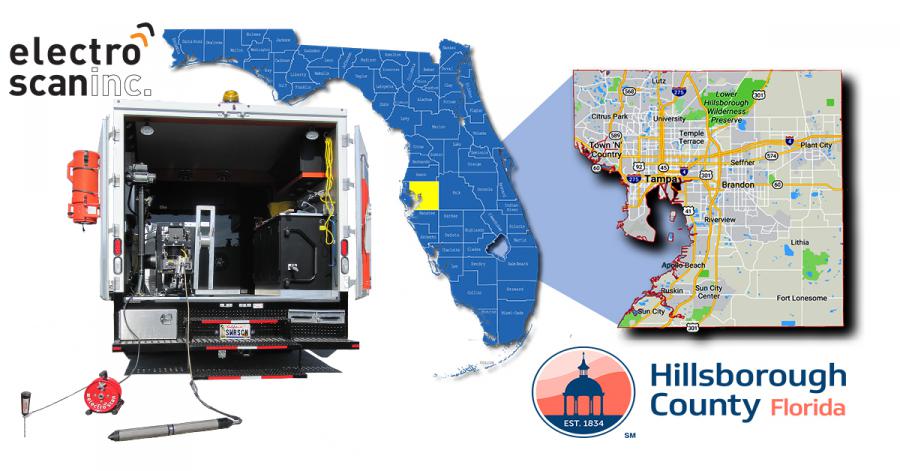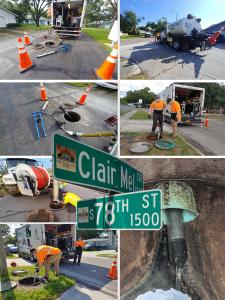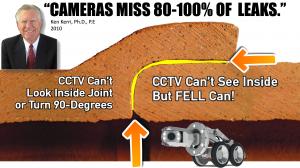
Major Four-Year Study on Sewer Pipeline Repairs Shows Failure of CCTV Cameras to Assess Pipe Conditions and Repairs
Results Submitted as Part of 'Call for Evidence' Issued by British DEFRA's Independent Water Commission, Along with Other International Case Studies.
SACRAMENTO, CA, UNITED STATES, April 24, 2025 /EINPresswire.com/ -- Electro Scan Inc., a leading provider of AI and Machine-Intelligent underground leak detection solutions and lead water pipe detection tools, has released results from a four-year study from Hillsborough County, Florida, on sewer pipeline repairs.
As part of the study, overseen by an international consulting engineering firm, results documented the consistent failure of closed-circuit television (CCTV) cameras to correctly assess pipe conditions and the inability of CCTV to certify the operational readiness of pipes after repairs.
The study spanned a four-year period that originally attempted to use CCTV cameras to recommend specific repairs in an area prone to consistently high levels of infiltration during and after wet weather events.
Once CCTV cameras were determined to be ineffective in locating specific sources of inflow & infiltration (I&), Electro Scan Inc. was contracted to inspect the same area using Focused Electrode Leak Location (FELL); also referred by the EPA as Electrical Resistance Testing (ERT).
The study represented the first time CCTV results were independently tested for pre- and post-rehabilitation effectiveness; specifically to find and quantify reductions in flow achieved by pipe repairs.
Worldwide, CCTV cameras have been the principal diagnostic tool to inspect internal sewer & stormwater pipes to find defects and to certify the workmanship of repairs and rehabilitation. More recently, untethered CCTV cameras have attempted to assess large diameter pipes while flowing at partial capacity.
Additionally, several startups such as SewerAI, Subterra, and VAPAR, have introduced image recognition solutions (based on CCTV) to replace manual viewing of videos to streamline CCTV reporting.
But, as more widespread and longer lasting wet weather events have occurred, CCTV and AI-CCTV analysis of underground sewer pipes has proven ineffective at locating specific sources of infiltration, such as cracks, joints, and connections, that contribute to sewer backups and overflows.
As higher tides have been experienced, cities like Baltimore, Boston, New Orleans, Miami, and San Francisco, are increasingly fighting saltwater incursion into their sewer systems, with CCTV cameras (again) unable to locate specific entry or exit points, into or out of piping.
Recognizing the growing limitations of CCTV cameras to locate I&I, Hillsborough County's Water Resource Department, Infrastructure Maintenance Division contracted with California-based Electro Scan Inc. to utilize its new AI-based FELL technology to automatically locate pipe defects and estimate leak severities in either gallons per minute or liters per second.
Highlights of CCTV inspections delivered by independent NASSCO PACP® certified contractors for the study, included the following:
• CCTV inspections of 92% of pre-rehabilitation sewer mains reported ZERO structural or operational & maintenance defects, i.e. no defects.
• Only one (1) pre-rehabilitation CCTV report contained a single infiltration-rated defect, i.e. INFILTRATION WEEPER.
• Pre-rehabilitation CCTV reported only 5 of 283 service connections with defects. Post-rehabilitation CCTV reported defects were ZERO.
• All CCTV inspections of Cured-In-Place Pipe (CIPP) reported PACP® Quick Overall Ratings of 0000 (i.e. no defects), with several liners showing registering FELL leak locations and defective service re-connections.
Expanding its scope to compare pre- and post-rehabilitation pipe conditions using CCTV and FELL, Hillsborough County wished to determine rehabilitation effectiveness using multiple repairs recommended by its independent consulting engineer.
Pipe rehabilitation included repairs to existing CIPP, vitrified clay pipes (VCP), and polyvinyl chloride (PVC) pipes.
While CCTV cameras were unable to provide any reasonable recommended repairs, FELL-AI inspection results were exclusively used to determine pipe repairs and rehabilitation.
CCTV found ZERO defects in all post-rehabilitation inspections. In contrast, FELL-AI measured a combined 53% reduction in estimated infiltration flows after pipe rehabilitations were completed.
According to FELL, 2,967.4ft (904m) or 11% of sewer mains registered a 100% reduction in flow after rehabilitation; however, 3,778.4ft (1,152m) or 14% of sewer mains registered greater defect flows after rehabilitation, then before rehabilitation, primarily due to faulty repairs and damage to interior pipe walls.
In recognition of the global implications of the Hillsborough County study, Electro Scan's British-based wholly subsidiary, Electro Scan (UK) Limited submitted results to the Department of Environment, Food, and Rural Affairs (DEFRA) Call for Evidence issued by its Independent Water Commission.
According to DEFRA, the task of the Commission is to explore potential changes in the UK water business and make recommendations on how to reform the system to meet the challenges of the future and restore the trust that has been lost.
The scope of the Commission covers the strategic water management in England and Wales, with Scotland and Northern Ireland outside the scope of the Commission.
DEFRA's Independent Water Commission Call for Evidence ran for 8 weeks; opened on 27 February 2025 and closed 23 April 2025.
Asked whether CCTV benefits from the use of AI to better recommend repairs, Electro Scan Inc.'s Chairman & Founder, Chuck Hansen, replied "Applying AI to CCTV cameras to assess sewers is like applying AI to Blockbuster Video. It just can't help a broken business; especially with Netflix or another streaming service waiting in the wings.
Hansen will be presenting results of the study at the 2025 WEF/WEAT Collection Systems Conference, Thursday, July 17, 2025, Session 13: Leveraging Technology for Sewer Management, 9:00 AM Central, Hillsborough County, Florida, Pre- and Post-Rehabilitation Effectiveness Project for Wastewater Assessment Project Using Electrical Resistance Testing.
Last year, Electro Scan completed a citywide assessment of a Northern California town where its estimated peak infiltration matched the maximum treatment plant capacity during a major wet weather event.
In 2018, Electro Scan Inc. estimated a 75% reduction in flow in a 5,560ft post-rehabilitated CIPP project at the City of Racine, Wisconsin. With project management provided by Short Elliott Hendrickson Inc. (SEH®), FELL results were compared to a Teledyne ISCO 2141 Area Velocity Flow Module and Sensor, that showed identical reductions in flow after a two-year flow monitoring study.
Visual inspection is still a good tool to see alignment issues, construction debris, crossbores, FOG, and protruding laterals, especially for ongoing maintenance; but no longer valid to identify defects, prioritize repairs, or certify the operational readiness of CAPEX, including CIPP.
According to Stratview Research the global CIPP market is project to grow at 4.9% annually from 2024 to 2030 with an anticipated size of US$3.8 billion by 2030. Yet, CCTV cameras routinely provide false-positive readings that cannot be relied on to ensure a 50-75 year useful life, with other QA/QC tools like fiber optics unable to test 360-degrees of wall surfaces.
ABOUT ELECTRO SCAN INC.
Founded in 2011, Electro Scan is an international supplier of AI and machine-intelligent pipeline assessment and quality assurance products & services for the water, sewer, and oil & gas markets. The company develops and markets proprietary equipment and SaaS-based cloud applications that automatically locates, measures, and reports pipeline leaks and water service line pipe materials, including lead pipes. The company's products and services detect buried lead water services, typically not found by legacy inspection methods.
According to Stratview Research the global CIPP market is project to grow at 4.9% annually from 2024 to 2030 with an anticipated size of US$3.8 billion by 2030.
Janine Mullinix
Electro Scan Inc.
+1 916-779-0660
email us here
Visit us on social media:
Facebook
X
LinkedIn
Instagram
YouTube
Distribution channels: Banking, Finance & Investment Industry, Building & Construction Industry, Environment, Insurance Industry, Natural Disasters
Legal Disclaimer:
EIN Presswire provides this news content "as is" without warranty of any kind. We do not accept any responsibility or liability for the accuracy, content, images, videos, licenses, completeness, legality, or reliability of the information contained in this article. If you have any complaints or copyright issues related to this article, kindly contact the author above.
Submit your press release




